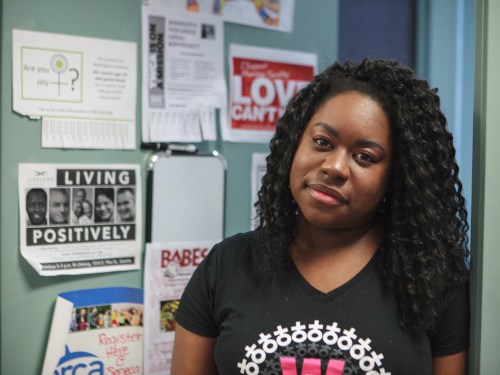SUBSCRIBE TO THE FREE NEWSLETTER
A big step toward an HIV cure in Seattle
Yesterday in Seattle, there was big news about the path to a cure for HIV.
At the Conference on Retroviruses and Opportunistic Infections (CROI) which is being held in Seattle, it was announced that a second person–called the “London patient” because he prefers to be anonymous– has been cured of HIV through a rigorous process involving bone marrow transplants. The announcement appears to confirm that there is a repeatable procedure that can make a person with HIV clear of the virus.
The announcement comes as Fred Hutchinson Cancer Research center in Seattle is making strides toward a cure for HIV. Last month, Cascadia Magazine published a feature, “Seattle’s HIV Hope,” by Niki Stojnic, which profiles researchers and advocates for HIV-positive people about what a path to a cure might look like. Among those interviewed is Tranisha Arzah, an HIV-positive advocate who works to bridge the divide between scientists and people with the disease.
“Thanks to advancements in knowledge and technology, accelerating the search for a cure is more possible now than ever. “It’s the right time,” says Keith Jerome, a virologist with Fred Hutch.”
Read the full article on progress being made in Seattle toward a cure for HIV at this link.
And if you appreciate great reporting like this, please consider becoming a supporting reader of Cascadia Magazine and visiting our donate page. We depend on the financial support of readers like you to make articles like this possible.
Cascadia Magazine original: House Arrest
In “House Arrest,” an essay online at Cascadia Magazine, poet Danika Dinsmore chronicles the deep bonds she built during her arrest and sentencing demonstrating against the expansion of the Trans Mountain pipeline across British Columbia. It’s an inspiring call to action for those who can no longer stand by as the planet is sacrificed to corporate greed.
“I am no hero. My fellow protestors and I agree: our courage is not extraordinary. We were simply so deep in our despair we were overcome with the need to do something. . . . Crossing the injunction line was the easiest thing to do at the time, because not crossing, not acting, not demanding was more frightening.”
Read the full article here.
Climate change candidate Inslee’s struggles in Washington
The AP’s Rachel La Corte has sharp piece which notes that although Washington governor Jay Inslee is running as a candidate dedicated to pushing for action on climate change, his record in the state is mixed, especially the failure of a carbon tax on the ballot last year. And in related news, the WA legislature is planning to send Inslee’s candidacy a gift by moving up its presidential primary to March. Meanwhile, in Oregon, senator Jeff Merkley announced he won’t be running for president.
Oregon considers revising rules for sentencing of minors
Portland Mercury reports on an effort at sentencing reform in Oregon that would eliminate the requirement that youths age 15-17 be tried as adults for certain crimes. And at Crosscut, Melissa Santos has a great feature on efforts in Washington to revise rules that currently make it a crime for teens to swap nude selfies with each other.
The Lummi Nation’s connection to orcas
Raynell Morris, writing an opinion piece for the Seattle Times, talks about the deep connection between the the Lummi Nation in Washington and the orcas of the Salish Sea. It’s why the tribe has taken steps to feed starving orcas, and is calling for bold measures from state, provincial, and federal governments to save the orcas.
Firefighting foam toxics in Portland’s water
OPB has an investigative report on how firefighting training exercises with a flame-reducing foam have introduced high levels of toxic chemicals into the groundwater of northeast Portland, possibly contaminating wells and drinking water. In related news, the Seattle Times reported that lead levels in drinking water at Seattle public schools are above approved lead standards in 97 percent of schools.
A Seattle Super Hiker
The Seattle Times profiles Heather Anderson, a Seattle-based hiker who became the first woman to achieve the coveted “triple crown” of long-distance hiking: completing North America’s Pacific Crest Trail, Continental Divide Trail, and Appalachian Trail in one season. “I would hike upward of 18 hours a day. I hiked through the night. So I feel like I see more because I see all of the animals that come out at night, instead of just the ones that are out during the day.” Check out Anderson’s new book Thirst: 2,600 Miles to Home at Mountaineers Books.
An chat with the editors of Moss literary magazine
Over at the Los Angeles Review of Books, you should check out a great interview with Alex Davis-Lawrence and Connor Guy, the editors and creators of Moss, a fantastic literary mag dedicated to publishing a wide variety of literature from across Cascadia. “It’s about the Northwest and its merits, but also the idea that place is important to a writer’s work and identity, in and of itself.”
That’s this evening’s assortment of news, arts, and culture from across the Pacific Northwest.
If you appreciate what we’re doing with this newsletter and the online features at Cascadia Magazine, we’d really appreciate if you’d send us a few dollars at our donate page. Thanks a million! –Andrew Engelson
Photo credits: advocate Tranisha Arzah courtesy Fred Hutch

